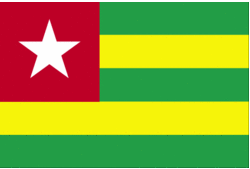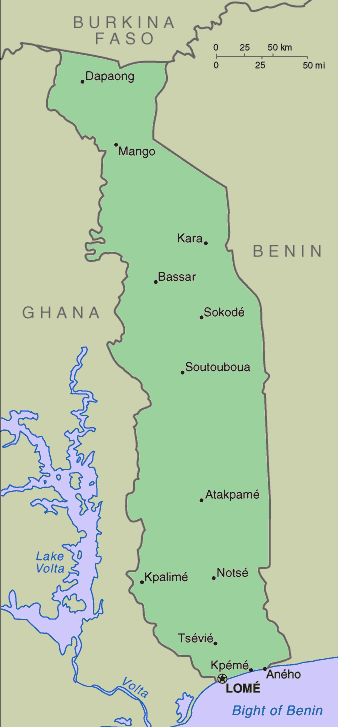Traveling Luck for Togo. Togo, Africa
Togo is located in Western Africa, bordering the Bight of Benin, between Benin and Ghana.
Land in Togo is gently rolling savanna in north; central hills; southern plateau; low coastal plain with extensive lagoons and marshes.
Togolese land covers an area of 56785 square kilometers which is slightly smaller than West Virginia
Togo has borders with Burkina Faso for 126km, Benin for 644km and Ghana for 877km.
 Togolese national flag (Flag of Togo)
Togolese national flag (Flag of Togo)
As for the Togolese climate; tropical; hot, humid in south; semiarid in north.
Togolese (singular and plural) speak French (official and the language of commerce), Ewe and Mina (the two major African languages in the south), Kabye (sometimes spelled Kabiye) and Dagomba (the two major African languages in the north).
Places of note in Togo
 Togolese map
Togolese map
Regions of Togo
French Togoland became Togo in 1960. Gen. Gnassingbe EYADEMA, installed as military ruler in 1967, continued to rule well into the 21st century. Despite the facade of multiparty elections instituted in the early 1990s, the government continued to be dominated by President EYADEMA, whose Rally of the Togolese People (RPT) party has maintained power almost continually since 1967. Togo has come under fire from international organizations for human rights abuses and is plagued by political unrest. While most bilateral and multilateral aid to Togo remains frozen, the EU initiated a partial resumption of cooperation and development aid to Togo in late 2004 based upon commitments by Togo to expand opportunities for political opposition and liberalize portions of the economy. Upon his death in February 2005, President EYADEMA was succeeded by his son Faure GNASSINGBE. The succession, supported by the military and in contravention of the nation's constitution, was challenged by popular protest and a threat of sanctions from regional leaders. GNASSINGBE succumbed to pressure and agreed to hold elections in late April 2005 which legitimized his succession.
This small, sub-Saharan economy is heavily dependent on both commercial and subsistence agriculture, which provides employment for 65% of the labor force. Some basic foodstuffs must still be imported. Cocoa, coffee, and cotton generate about 40% of export earnings, with cotton being the most important cash crop. Togo is the world's fourth-largest producer of phosphate. The government's decade-long effort, supported by the World Bank and the IMF, to implement economic reform measures, encourage foreign investment, and bring revenues in line with expenditures has moved slowly. Progress depends on follow-through on privatization, increased openness in government financial operations, progress toward legislative elections, and continued support from foreign donors. Togo is working with donors to write a PRGF that could eventually lead to a debt reduction plan.
Togolese natural resources include phosphates, limestone, marble, arable land
the country's length allows it to stretch through six distinct geographic regions; climate varies from tropical to savanna
Togolese religion is indigenous beliefs 51%, Christian 29%, Muslim 20%.
Natural hazards in Togo include hot, dry harmattan wind can reduce visibility in north during winter; periodic droughts.
Travel Advice for Togo
TogoSUMMARY
- Since the Presidential elections in April 2005, there has been a sustained period of relative calm in Togo. However, outbreaks of civil unrest could occur at anytime. In the past demonstrators have targeted expatriates (see Political Situation for more details).
- Entry and exit points at borders can be opened and closed without warning.
- There is no formal British representation in Togo.
- Crime is common in some areas of Lome. Car-jackings have also been reported.
- The threat from terrorism is low, but you should be aware of the global risk of indiscriminate terrorist attacks, which could be against civilian targets, including places frequented by foreigners.
- You need a visa to enter Togo. Overstaying on your visa without proper authority is a serious matter and can lead to detention or refused permission to leave the country until a fine is paid.
- The main type of incident for which British nationals require consular assistance in Togo is for replacing lost and stolen passports.
- We strongly recommend that you obtain comprehensive travel and medical insurance before travelling. You should check any exclusions, and that your policy covers you for the activities you want to undertake. Please see: Travel Insurance.
SAFETY AND SECURITY
Foreign travellers are increasingly becoming targets by scam artists. The scams come in many forms, and can pose great financial loss to victims. Scam artists are also targeting individuals in the UK. Relatives or friends in the UK should first check with the person who has travelled to before becoming involved in the transfer of money. If you are concerned about someone who has travelled to Togo you should contact the Consular Section of the British High Commission, Accra (E-mail: high.commission.accra@fco.gov.uk. Schemes in operation by West African criminal networks are designed to facilitate victims parting with money, known as advance fee or 419 fraud. Scam artists are also known to be targeting internet dating/personal sites with the intention of soliciting money from victims. For further information on advance fee fraud please see: http://www.met.police.uk/fraudalert.
Political Situation
There has been a sustained period of relative calm in Togo following the disputed Presidential elections in April 2005, which led to violent clashes between Government and opposition supporters and included attacks on expatriates. Although a Government of National Unity has now been formed, the main opposition party has so far refused to be part of it. Dialogue between the main opposition party and Government is ongoing but with little substantive progress. Further political unrest and demonstrations could occur without warning.
Air Safety
The EU has published a list of air carriers that are subject to an operating ban or restrictions within the community. You should check http://europa.eu.int/comm/transport/air/safety/flywell_en.htm to see whether this will affect your travel.
ENTRY REQUIREMENTS
HEALTH
GENERAL
The number of British visitors to Togo is low. The main type of incident for which British nationals require consular assistance in Togo is for replacing lost and stolen passports. You should keep a photocopy of your passport separate from your passport. This will help to speed up the process of issuing a new one.
The Central Bank (BCEAO) has issued the following new CFA notes and coins in Togo: 10000, 5000, 2000 and 1000 CFA notes; 500 and 200 CFA coins. The old notes ceased to be legal on 31 December 2004.
You are advised to reconfirm flights 48 hours prior to departure.
There is no formal UK representation in Togo. In case of an emergency you should contact the British High Commission in Accra, Ghana (see contact details below).
We recommend that British passport holders who intend to stay in Togo for 3-months or more register with British High Commission in Accra.
OTHER

 Search
Search Togo country profile
Togo country profile Travel advice for Togo
Travel advice for Togo